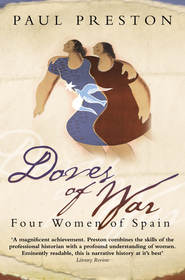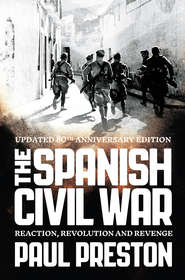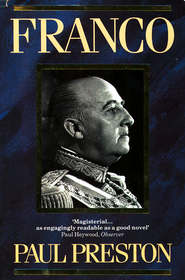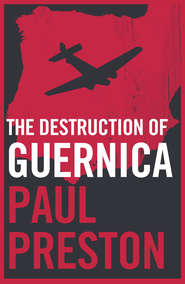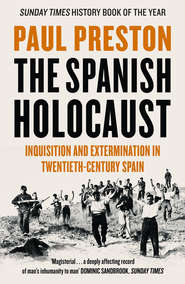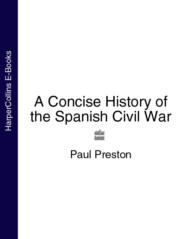По всем вопросам обращайтесь на: info@litportal.ru
(©) 2003-2024.
✖
Juan Carlos: Steering Spain from Dictatorship to Democracy
Настройки чтения
Размер шрифта
Высота строк
Поля
Franco had not been concerned while the Prince was in one or other of the military academies, ‘temples of patriotic exaltation and schools of virtue, of character-building, of the exercise of command, of discipline and of the fulfilment of duty’. ‘In the light of all this, and given the age of the Prince, I believe that the education of Juan Carlos over the next few years is more a question of State rather than one concerning a father’s rights and it is the State that should have priority in deciding the overall educational plan and the necessary guarantees.’ He suggested that the Prince’s director of studies should be a history professor who had fought in the Civil War with the Requetés, the ferocious Carlist militia that had played a crucial role in Franco’s war effort, was a member of the Opus Dei and was now a priest – a reference to the deeply conservative Federico Suárez Verdeguer. Should Don Juan disagree, Franco was contemplating putting the entire matter of the Prince’s education in the hands of the Consejo del Reino. Franco closed the letter with the ominous statement that he would consider a meeting to discuss the details only after certain misunderstandings had been cleared up, given that what separated them was a major issue of principle.
(#litres_trial_promo)
Don Juan’s reply was conciliatory. This reflected the role played in its drafting by the newly installed president of his Privy Council, José María Pemán. According to Pemán himself, he had been selected for the job precisely because he had no political ambitions of his own and he got on well with Franco. Now, to Don Juan’s text, he added what he called ‘the perfume so necessary for El Pardo’.
(#litres_trial_promo) Don Juan seems not to have perceived that Franco’s growing interest in the boy was as his direct successor not as the eventual heir to his father. The letter began by recognizing that ‘it would be absurd for him not to receive an eminently patriotic education, inspired in the same loyalty to the fundamental principles of the Movimiento that he had imbibed in the military academies’. He recognized that the interests of the State should be paramount. He accepted Franco’s suggestion of Suárez Verdeguer and other professors. Regarding the issue of whether the monarchy would try to alter the Francoist State, he engaged in an extraordinary juggling act. Recognizing that some of his supporters wanted a parliamentary monarchy, while others such as the Carlists were virulently opposed to it, he still claimed that his loyalty to the principles of the Movimiento was unquestionable. He also called, rather optimistically, for Franco to make a declaration that: ‘the way in which the Prince’s education is taking place does not prejudge the question of the succession nor alter the normal transmission of dynastic obligations and responsibilities.’ Pemán had already begun some behind-the-scenes negotiations with a sympathetic Carrero Blanco. That they had borne fruit was revealed in Franco’s reply nearly four weeks later in which he offered a meeting on 21 or 22 March at the Parador of Ciudad Rodrigo near the Portuguese border.
(#litres_trial_promo)
News of the impending meeting stimulated rumours that major decisions about the future were imminent. Franco was now 67 and gossip was rife that his health was failing. On returning in his Rolls Royce from a hunting party in Jaén on 25 January 1960, a fault in the heating system had led to the rear of the car being filled with exhaust fumes. Noting his drowsiness, Doña Carmen had the presence of mind to order the car stopped before any serious harm was done. Wild rumours circulated within the regime, although Franco assured Pacón that he had suffered only a severe headache. Nevertheless, particularly after an announcement from the Rolls Royce Motor Car Company that exhaust gases could enter the car only if there had been deliberate tampering, the incident provoked speculation that something sinister had happened.
(#litres_trial_promo) So, when news of the proposed meeting at Ciudad Rodrigo was broadcast on foreign radio stations and leaked in the press, gossip raced around Madrid that Franco planned to hand over power to Don Juan. Journalists, radio reporters and newsreel cameramen descended on the border town ready to flash the news to the world’s capitals. Deeply irritated, Franco postponed the meeting for seven days and changed the venue.
Franco was infuriated by the rumours that he assumed to have emanated from Estoril and the change of venue was meant as a reprimand for Don Juan. Nevertheless, given the eager talk about Franco’s mortality, enormous significance was read into Franco’s third meeting with Don Juan, their second at Las Cabezas, on 29 March 1960.
(#litres_trial_promo) Las Cabezas had been inherited, on the Conde de Ruiseñada’s death, by his son, the Marqués de Comillas. Talking to Pacón before the meeting, Franco made it quite clear how little he planned to offer. He stated categorically, ‘as long as I have my health and my mental and physical faculties, I will not give up the Headship of State.’
(#litres_trial_promo)
Pedro Sainz Rodríguez was beginning to suspect that not only would Franco not relinquish power before his death but that he would also pick as successor someone other than Don Juan. Of the various competing candidates, Juan Carlos would be preferable, but Don Juan had no desire to lose the throne even to his son. Accordingly, in his preparatory notes for the Pretender, Sainz Rodríguez argued that he must insist that: ‘the presence of the Prince must not be used to carry out manoeuvres suggesting that there is any agreement by which the order of succession can be altered.’ This threat came to be referred to by Sainz Rodríguez as ‘balduinismo’ – a reference to King Baudouin of Belgium who had ascended the throne in 1951 after the abdication of his father, Leopold III.
(#litres_trial_promo)
A grey-suited Franco arrived with a staff of 82 in a convoy of 11 Cadillacs. He was accompanied by the Ministers of Education and Public Works, as well as numerous security guards and aides, two cooks and a doctor. Apart from the driver, Don Juan was accompanied only by his private secretary, Ramón Padilla, and the Duque de Alburquerque. In contrast with their two previous meetings, the Caudillo manifested somewhat less interest in bringing Don Juan around to his point of view, having already eliminated him as a possible successor. In the event of ever needing to organize a rapid succession process, Franco had long since decided not to offer the throne to Don Juan. Rather, he would pick Juan Carlos and simultaneously ask Don Juan to abdicate, confident that he would agree rather than risk a public break with his son. For some time to come, he would astutely refrain from making that decision public, convinced that if he did so, Juan Carlos would side with his father. Nevertheless, the notion underlay his agenda at Las Cabezas which went no further than criticism of Don Juan’s collaborators and discussion of the details of the Prince’s remaining education. Don Juan, for his part, firmly expressed his concern at the way Franco was seemingly fostering the claims of other pretenders to the throne. It was no small triumph when he successfully pressed Franco to admit that some of them (certainly Don Jaime) were receiving financial support from the Secretary-General of the Movimiento.
Don Juan complained vigorously about the continuing anti-monarchist propaganda in Spain. In particular, he protested about a book, Anti-España 1959, published in Madrid by an obsessive regime propagandist, Mauricio Carlavilla, who was also a secret policeman. The book denounced the monarchist cause as the stooge of freemasonry and a smokescreen for Communist infiltration, as well as insinuating that Don Juan himself was a freemason. Hundreds of copies had been sent by the Movimiento to people in official positions. Don Juan knew that the censorship apparatus would not have permitted the book to be distributed while Juan Carlos was resident in Spain without the Caudillo’s connivance. Now, Franco, who could plausibly have feigned ignorance, once again claimed evasively that he had no control over the press. He asserted that patriotic journalists must have seen the book as a reply to the memoirs of the monarchist aviator Juan Antonio Ansaldo, published in Buenos Aires in 1951.
(#litres_trial_promo)
This revealed that, even if Franco had not commissioned Carla-villa’s book, he certainly approved of its contents. Ansaldo’s ¿Para qué …? (For What?) had referred to Franco as ‘the usurper of El Pardo’ and attacked his failure to restore the monarchy as a betrayal of the sacrifices made in the Civil War against the Republic. Don Juan pointed out that there was little need for a reply to a book that had been banned in Spain. He went on to complain about the constant attacks to which the monarchy had been subjected by the Movimiento press over the previous 15 years. Implying again that the press was beyond his control, Franco shiftily attributed these criticisms to indignation over the 1945 Lausanne Manifesto on the part of journalists. Franco exposed his identification with Carlavilla’s views by referring bitterly to members of Don Juan’s Privy Council as ‘traitors’. He spent 25 minutes criticizing Pedro Sainz Rodríguez as a freemason, to which Don Juan replied that nothing that he had heard could persuade him that his piously Catholic adviser could be a mason. Somewhat rattled by this, Franco replied darkly that he knew of other masons in Don Juan’s circle including his uncle ‘Ali’ – General Alfonso de Orleans Borbón – and the Duque de Alba. When Don Juan burst out laughing at this, Franco finally desisted.
The remainder of the interview dealt with the education of Juan Carlos. Franco suggested that, while he would start off with a residence in El Escorial, he should soon move to the palace of La Zarzuela. Just outside Madrid, on the road to La Coruña, La Zarzuela was very near to Franco’s own residence at El Pardo. The interest shown by the Caudillo in this respect led Pemán to note in his diary, ‘La Zarzuela is being prepared for him and Franco is personally taking charge of its furnishing like a doting grandfather.’ Franco also suggested that Juan Carlos should work in Admiral Carrero Blanco’s Presidencia del Gobierno although nothing came of this suggestion. He agreed to the appointment of the Duque de Frías as the head of Juan Carlos’s household. There was then a detailed discussion of a list of members of the ‘study committee’ that was to oversee the Prince’s civilian education. Franco had brought a list with him, which included names such as that of Adolfo Muñoz Alonso, the Falangist head of the same censorship organization that had permitted the publication of Carlavilla’s book and of endless attacks on the monarchy. In this part of the conversation, Don Juan commented later, Franco was more flexible than in previous meetings: ‘he abandoned his usual dogmatic style of a schoolteacher dealing with an ignorant schoolboy.’ Franco, in contrast, told Pacón later that: ‘I said to Don Juan everything that I had to say to him and that he had to hear.’
Just before Franco rose to leave, Don Juan gave him the text of a proposed communiqué prepared by Sainz Rodríguez, in line with the notes that he had drawn up before the meeting. It stated that the talks had taken place in a cordial atmosphere and repeated once more that Juan Carlos’s education in Spain ‘does not prejudge the question of the succession nor prejudice the normal transmission of dynastic obligations and responsibilities’. It closed with the statement that ‘the interview ended with the strengthened conviction that the cordiality and good understanding between both personalities is of priceless value for the future of Spain and for the consolidation and continuation of the benefits of peace and the work carried out so far’. A visibly displeased Franco read the text and discussed it at length with Don Juan. He argued the text point by point. He protested at a reference to Juan Carlos as Príncipe de Asturias. Acceptance of that title would have signified public recognition that Don Juan was the King, so Franco slyly claimed that it was inadmissible on the grounds that it had not been ratified by the Cortes. Don Juan conceded the point.
The discussion grew more conflictive over the statement that Juan Carlos’s presence in Spain had no implications for the succession to the throne. Franco balked at this, saying it was ‘duro’ (harsh). Don Juan replied that this was, for him, the central issue and he insisted that it, or a similar sentence, must appear in the communiqué. The Caudillo continued to make objections until Don Juan said with studied weariness, ‘Well, General, if for whatever reason you find this note to be inopportune, I’m in no hurry. The academic year is well advanced, so I could keep the boy with me until October.’ At that, Franco accepted the text with alacrity.
(#litres_trial_promo) Don Juan returned to Estoril, convinced that he had scored an important victory. On the following day, his staff went ahead and issued the agreed text in good faith. However, to their astonishment, the version that every Spanish newspaper was obliged to publish contained significant variants from Don Juan’s text. On arriving at El Pardo late on 29 March, Franco had unilaterally amended the agreed communiqué.
(#litres_trial_promo)
He added a reference to himself as Caudillo, a title never acknowledged by Don Juan. To the phrase which made it clear that Juan Carlos’s presence in Spain had no bearing on the transmission of dynastic responsibilities, he added ‘in accordance with the Ley de Sucesión’. He thereby gave the impression that Don Juan now accepted the law, which in fact he repudiated. In the last sentence, he removed the phrase ‘both personalities’ lest he and Don Juan should be seen to be on an equal footing. Finally, he added to the reference to ‘the work carried out so far’ the words ‘by the Movimiento Nacional’, thereby implying that Don Juan was fully committed to it and that future relations between them would take place in that context.
(#litres_trial_promo) This last phrase, and the reference to the Ley de Sucesión, were generally interpreted as clear acceptance by Don Juan of Franco’s system. According to the British Ambassador, the entire political élite was ‘scrutinising the communiqué as if it were a Dead Sea Scroll’.
(#litres_trial_promo)
The Spanish censorship machinery blocked all attempts from Estoril to have the correct version published. To rub salt into the wound, the Spanish press printed accusations that Don Juan had dishonestly omitted the references that in fact Franco had added. Don Juan was understandably annoyed by Franco’s underhand dealing. However, he wrote him an astute letter, drawing his attention to this apparent interference by third parties anxious to undermine the cordial relations between them. Giving Franco the perfect let-out, he wrote: ‘I imagine that Your Excellency had nothing to do with these changes to what we agreed which, like me, you must have seen for the first time in print.’ However, Franco replied quite brazenly that he had expressly authorized the changes, which he declared to be ‘tiny’ and merely clarifications of what they had agreed at Las Cabezas. Moreover, he reproached Don Juan for publishing the agreed text on the grounds that the communiqué was to be issued only in Madrid. Franco told his cousin Pacón, ‘The note published by the press was brought already drafted by Don Juan. I made some objections. When I reached Madrid and I realized that it lacked a few words about the Movimiento Nacional, I had no hesitation about adding them since Don Juan had not objected when they were mentioned in our conversation. There was no need to consult with him since I knew that he would have to agree.’
(#litres_trial_promo)
At some level, Don Juan must have known that Franco wanted him to abdicate in favour of his son. Presumably hoping to dispel his own fears, at Las Cabezas, Don Juan had told Franco that he had been asked by Harold Macmillan, the British Prime Minister, if there was any truth in rumours that he was planning to do so. He told Franco that he had vehemently denied having any such intention but had no doubt that the gossip quoted by Macmillan had emanated from Madrid.
(#litres_trial_promo) Don Juan had every reason to be concerned. In early April, just a few days after the publication of the communiqué, Carrero Blanco spoke to Benjamin Welles, the correspondent of the New York Times. Carrero dismissed monarchist claims that the Las Cabezas meeting had reasserted Don Juan’s position. ‘Juan Carlos will be King one day. If anything suddenly happens to Franco, he will have to ascend the throne.’ The startled American journalist asked, ‘What about Don Juan? Is he not first in line?’ Carrero Blanco paused interminably before answering dismissively, ‘He is already too old.’
(#litres_trial_promo)
Juan Carlos returned to Spain in April 1960 to take up residence in the ‘Casita del Infante’, sometimes known locally as the ‘Casita de Arriba’, a small palace on the outskirts of El Escorial, which had been prepared for Franco lest he needed a refuge during the Second World War. It was also known as ‘Casa de los Peces’ (the House of the Fishes), because behind the house there was a pond full of baby carp. Once established there, it was not long before he was received in audience by the Caudillo. It was apparent that Franco’s contempt for Don Juan was matched by a growing affection for the Prince. He continually muttered to Pacón that the Pretender was surrounded by evil influences, such as Sainz Rodríguez, whom he denounced as a leftist and a freemason. ‘Don Juan lives with a coterie of enemies of the regime of whom the most dangerous is Sainz Rodríguez.’ When Pacón innocently asked if Sainz Rodríguez had not once been one of his ministers, Franco replied that he didn’t know him then and had appointed him only at the insistence of Ramón Serrano Suñer. This was a lie, since they had been friends in Oviedo when Franco was stationed there as a Major. On 27 April, he wrote to Don Juan: ‘in the last few days, I had occasion to receive the Prince and talk with him at length. I found him much more grown up than in my last interviews with him and very sensible in his judgements and opinions.’ He invited Juan Carlos to return soon for lunch. The writing on the wall for the Prince’s father was clearer than ever.
(#litres_trial_promo)
Sir Ivo Mallet, the British Ambassador in Madrid, was in no doubt that Franco had no intention of standing down until he had seen whether Juan Carlos was a suitable successor. It is hardly surprising that, in late May, Don Juan told Benjamin Welles of his anxiety that his son might be ‘persuaded by the atmosphere, by flattery and by propaganda into abandoning his loyalty to his father and accepting the position of Franco’s candidate for the throne’. To prevent this happening, he said, he had appointed as the head of the Prince’s household the Duque de Frías. What is extraordinary is that Don Juan appears not to have discussed his fears with his son.
(#litres_trial_promo)
Don Juan continued to resist his own dawning perception of the scale of Franco’s deception. In late April, he told Sir Charles Stirling, the British Ambassador in Lisbon, that, at Las Cabezas, Franco had undertaken that there would be no further public attacks on members of his family.
(#litres_trial_promo) The Caudillo’s sincerity was revealed in May by a series of lengthy articles printed in Arriba, the principal Falangist newspaper. In laughably naïve terms, they blamed freemasonry for all the ills of Spain over the previous 200 years and managed to insinuate that the British royal family was responsible. Don Juan could hardly miss the implication for himself. The articles were signed by ‘Jakin-Booz’, a variant of Franco’s own pseudonym. At the beginning of the 1950s, writing as ‘Jakim Boor’, the Caudillo had written a series of articles and a book denouncing freemasonry as an evil conspiracy with Communism. On the instructions of the Ministry of Information and Tourism, this new series of articles was republished in full by the entire Spanish press. It was believed that this time the author was Admiral Carrero Blanco. An official of the Ministry told a British diplomat that, as a follow-up to accusations that Don Juan was a freemason, these articles were intended to stress the royal origins of freemasonry and bring the monarchy into disrepute.
(#litres_trial_promo)
The Spanish edition of Life magazine for 13 June 1960 carried an article on Don Juan in which he was quoted as saying that whatever form the restored monarchy might take, it would not be a dictatorship. Franco had thereupon communicated to Don Juan his displeasure at being called a dictator. Distribution of the magazine had been held up by the censors in Spain and Don Juan had been obliged to write and point out that he had merely stated that he himself would not be a dictator. Besides, he asked, how else could one describe Franco’s form of government? Don Juan believed that Franco eventually agreed to its release only because this was the first thing he had ever asked of him. However, according to the account given to the British Embassy by Benjamin Welles, Franco had said that if Don Juan wanted to commit political suicide, he did not see why he should do anything to stop him by holding up the article.
(#litres_trial_promo) In October, Franco showed Don Juan what he really thought. The Marqués de Luca de Tena, owner of ABC, gave a lecture to a monarchist club in Seville in which he extolled the Ley de Sucesión and the Franco regime. However, because he had pointed out that monarchists must accept the hereditary principle, saying: ‘A king is king because he is the son of his father’ and that, ‘if a king comes, the only possible king is Don Juan III,’ a report of the lecture in ABC was banned.
(#litres_trial_promo)
In the early autumn of 1960, in his capacity as president of Don Juan’s Privy Council, José María Pemán asked Franco to reveal his plans with regard to the succession. The Caudillo replied that he would be succeeded by the ‘traditional monarchy’, whose ‘incumbent’ he told Pemán with a straight face was Don Juan. He described him as ‘a good man, a gentleman and a patriot’. Compounding this farrago of deception, he denied that Don Juan had been eliminated and claimed that the thought of choosing Juan Carlos instead had never crossed his mind. He said that the Prince, ‘because of his age, is an unknown quantity’. In any case, he then went on to reveal that he had no intention of proclaiming the monarchy for a very long time: ‘My health is good and I can still be useful to my Fatherland.’
(#litres_trial_promo)
CHAPTER FOUR A Life Under Surveillance 1960–1966 (#ulink_0ff15634-b5c0-5734-a731-5bccc30ee9ea)
In October 1960, Franco received a perceptive report on Juan Carlos from one of his intelligence agents in Portugal. Commenting on the Prince’s presence at the celebration of his parents’ silver wedding anniversary, he wrote: ‘It is certainly the case that Juan Carlos seems more mature by the day, despite the patience and the humility that he has to put on in front of his father. Don Juan treats him harshly, even more so when there is someone present, and is constantly saying “your place is behind me”. It produces discord. The split probably won’t come because there’ll be a marriage and with it a new house, a new life and distance from his father who has got him tightly bound, like the feet of young Chinese girls in iron shoes. At the moment, and we know this from several sources, Juan Carlos is keen to get back to Spain and is fed up with his father and with his grandmother Doña Victoria Eugenia, whose company he finds every day more irksome. Marriage then is a political solution, a device so that the cord doesn’t break altogether.’ Franco must have been delighted to read that: ‘Juan Carlos feels happy only when he is away from Villa Giralda and with his Spanish friends. He has two personalities, one serious, sad and submissive towards his father, and the other when he is out of Don Juan’s sight, among his friends.’
(#litres_trial_promo)
At the time, it was strongly rumoured that the announcement of his engagement to María Gabriella di Savoia was imminent. The persistence of these rumours provoked frequent denials from Estoril. In early January 1961, as part of this process, Don Juan gave a long interview to Il Giornale d’Italia
Вы ознакомились с фрагментом книги.
Приобретайте полный текст книги у нашего партнера:
Приобретайте полный текст книги у нашего партнера:






